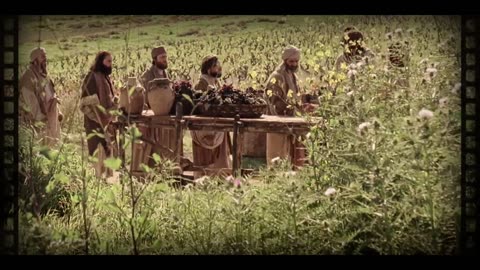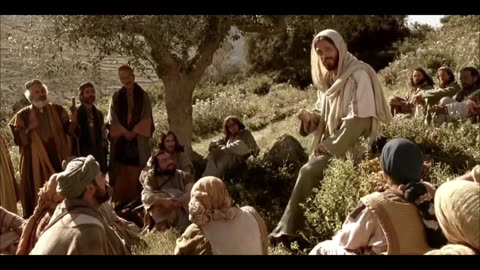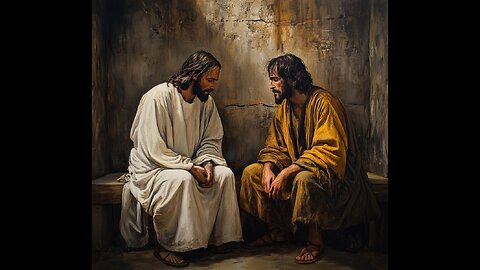-
1
Parables Of Christ Chapter 4
 Tomazzyhttps://www.youtube.com/@ThomasK-d1j The parable of the weeds, as presented in the context of Christ’s church, has profound meaning. In this parable, the Kingdom of Heaven is likened to a field in which good seed (wheat) has been sown, but also tares that have been sown by the enemy (the devil). Here are some key aspects of its meaning:The Church as a Field: The parable shows that the field is the world, and specifically the Church of Christ. The church is the place where believers are to grow and mature for God’s harvest.The Good Seed and the Tares: The good seed symbolizes the sons of the kingdom who are born of God’s word, while the tares represent those who are the fruit of false principles. There can be both true and false believers in the church, which leads to confusion and difficulty in assessing their true nature.Patience and Judgment: Christ teaches that the tares and the wheat will grow together until the harvest, meaning that we should not try to separate false believers from true believers, because this can lead to errors. The final judgment belongs to Christ, who will judge each person according to their words and deeds.Patience in the face of evil: The parable also teaches about God’s patience with sinners. There may be people in the Church who appear to be believers but are not. God endures this to give them a chance to repent.The final separation: At the time of the harvest, which symbolizes the end of time, there will be a final separation between the righteous and the wicked. Then those who are true believers will be gathered into God’s kingdom, and the tares will be cast out.In conclusion, the parable of the tares highlights the complexity of life in the Church, where true believers can be found alongside false ones. It teaches us that the final judgment belongs to God and that we should be patient and not judge others, because only He knows the hearts of people.9 views
Tomazzyhttps://www.youtube.com/@ThomasK-d1j The parable of the weeds, as presented in the context of Christ’s church, has profound meaning. In this parable, the Kingdom of Heaven is likened to a field in which good seed (wheat) has been sown, but also tares that have been sown by the enemy (the devil). Here are some key aspects of its meaning:The Church as a Field: The parable shows that the field is the world, and specifically the Church of Christ. The church is the place where believers are to grow and mature for God’s harvest.The Good Seed and the Tares: The good seed symbolizes the sons of the kingdom who are born of God’s word, while the tares represent those who are the fruit of false principles. There can be both true and false believers in the church, which leads to confusion and difficulty in assessing their true nature.Patience and Judgment: Christ teaches that the tares and the wheat will grow together until the harvest, meaning that we should not try to separate false believers from true believers, because this can lead to errors. The final judgment belongs to Christ, who will judge each person according to their words and deeds.Patience in the face of evil: The parable also teaches about God’s patience with sinners. There may be people in the Church who appear to be believers but are not. God endures this to give them a chance to repent.The final separation: At the time of the harvest, which symbolizes the end of time, there will be a final separation between the righteous and the wicked. Then those who are true believers will be gathered into God’s kingdom, and the tares will be cast out.In conclusion, the parable of the tares highlights the complexity of life in the Church, where true believers can be found alongside false ones. It teaches us that the final judgment belongs to God and that we should be patient and not judge others, because only He knows the hearts of people.9 views -
2
Parables Of Christ Chapter 3
 Tomazzyhttps://www.youtube.com/@ThomasK-d1j Jesus teachings trough parables According to the parable of the seed, man plays an important role in the process of seed growth, but his actions have their limitations. Man must prepare and enrich the soil and plant the seed, but he cannot make the seed germinate and grow on his own. The growth of the seed depends on the divine power that works in nature. Even if man makes every effort, he must rely on God, who unites sowing and reaping through his omnipotence.The parable emphasizes that the seed has within itself the power of germination that God has put into it, but left to itself it has no capacity to grow. Therefore, man, as the sower, has a role to play in preparing the soil of the heart, but the final growth and fruition are the work of God's power.17 views 1 comment
Tomazzyhttps://www.youtube.com/@ThomasK-d1j Jesus teachings trough parables According to the parable of the seed, man plays an important role in the process of seed growth, but his actions have their limitations. Man must prepare and enrich the soil and plant the seed, but he cannot make the seed germinate and grow on his own. The growth of the seed depends on the divine power that works in nature. Even if man makes every effort, he must rely on God, who unites sowing and reaping through his omnipotence.The parable emphasizes that the seed has within itself the power of germination that God has put into it, but left to itself it has no capacity to grow. Therefore, man, as the sower, has a role to play in preparing the soil of the heart, but the final growth and fruition are the work of God's power.17 views 1 comment -
3
Parables Of Christ Chapter 2
 Tomazzyhttps://www.youtube.com/@ThomasK-d1j Jesus teachings trough parables The parable of the sower is significant in the context of the Kingdom of Heaven because it illustrates how God’s Word is received by people and the effects of that acceptance. Jesus, as the sower, went out to sow “heavenly seed of truth,” which refers to the teaching of the Gospel and its impact on people’s lives.The parable presents different types of soil, which symbolize the different attitudes of people’s hearts toward the Word of God. The seed falls on the path, on rocky ground, among thorns, and on good soil, illustrating the different responses people have to God’s message. Only the seed sown on good soil bears fruit, indicating that only those who accept the Word with an open heart and are ready to act can experience the fullness of life in the Kingdom of Heaven.Christ emphasizes that the Kingdom of God will not be gained by force, but by implanting a new principle in people’s hearts, meaning that the true power of the Kingdom of Heaven lies in inner transformation and loyalty to God. This parable encourages listeners to reflect on how they receive God’s Word and what kind of hearts they have, which is crucial to their eternal destiny.In this way, the parable of the sower not only illustrates Jesus’ teaching, but also calls for a personal commitment to receiving and practicing His words, which is the foundation for life in the Kingdom of Heaven.10 views 2 comments
Tomazzyhttps://www.youtube.com/@ThomasK-d1j Jesus teachings trough parables The parable of the sower is significant in the context of the Kingdom of Heaven because it illustrates how God’s Word is received by people and the effects of that acceptance. Jesus, as the sower, went out to sow “heavenly seed of truth,” which refers to the teaching of the Gospel and its impact on people’s lives.The parable presents different types of soil, which symbolize the different attitudes of people’s hearts toward the Word of God. The seed falls on the path, on rocky ground, among thorns, and on good soil, illustrating the different responses people have to God’s message. Only the seed sown on good soil bears fruit, indicating that only those who accept the Word with an open heart and are ready to act can experience the fullness of life in the Kingdom of Heaven.Christ emphasizes that the Kingdom of God will not be gained by force, but by implanting a new principle in people’s hearts, meaning that the true power of the Kingdom of Heaven lies in inner transformation and loyalty to God. This parable encourages listeners to reflect on how they receive God’s Word and what kind of hearts they have, which is crucial to their eternal destiny.In this way, the parable of the sower not only illustrates Jesus’ teaching, but also calls for a personal commitment to receiving and practicing His words, which is the foundation for life in the Kingdom of Heaven.10 views 2 comments -
4
Parables Of Christ Chapter 1
 Tomazzyhttps://www.youtube.com/@ThomasK-d1j Jesus' teachings through parables The principles that guided Christ’s mission to the world, as taught in parables, can be summarized in several key points:Revelation of Divinity through Humanity: Christ took on a human nature so that people could know His divine character. His mission was to reveal heavenly things through earthly things, enabling people to understand divine truths through familiar experiences.Use of Parables as a Teaching Method: Jesus taught in parables to capture the attention and curiosity of his audience. Parables linked spiritual truths with everyday experiences, allowing people to better understand Christ’s teachings.Pointing to God Through Nature: Christ used natural elements to illustrate his teachings, which were intended to demonstrate divine wisdom and power. Nature was a handbook for people to lead them to know the Creator.Preparing Hearts to Receive Truth: Jesus wanted his teachings to be understood by all, including those who were not ready for deeper truths. He used parables to adapt his teaching to the level of understanding of his listeners.Encouragement to action and reflection: The purpose of the parables was not only to impart knowledge, but also to stimulate action and reflection on one’s own life and relationship with God. Christ wanted his listeners to not only listen, but also to think and apply his teachings in practice.These principles indicate Christ’s deep intention to lead people to a better understanding of God and to live in accordance with his will through his teachings and parables.9 views
Tomazzyhttps://www.youtube.com/@ThomasK-d1j Jesus' teachings through parables The principles that guided Christ’s mission to the world, as taught in parables, can be summarized in several key points:Revelation of Divinity through Humanity: Christ took on a human nature so that people could know His divine character. His mission was to reveal heavenly things through earthly things, enabling people to understand divine truths through familiar experiences.Use of Parables as a Teaching Method: Jesus taught in parables to capture the attention and curiosity of his audience. Parables linked spiritual truths with everyday experiences, allowing people to better understand Christ’s teachings.Pointing to God Through Nature: Christ used natural elements to illustrate his teachings, which were intended to demonstrate divine wisdom and power. Nature was a handbook for people to lead them to know the Creator.Preparing Hearts to Receive Truth: Jesus wanted his teachings to be understood by all, including those who were not ready for deeper truths. He used parables to adapt his teaching to the level of understanding of his listeners.Encouragement to action and reflection: The purpose of the parables was not only to impart knowledge, but also to stimulate action and reflection on one’s own life and relationship with God. Christ wanted his listeners to not only listen, but also to think and apply his teachings in practice.These principles indicate Christ’s deep intention to lead people to a better understanding of God and to live in accordance with his will through his teachings and parables.9 views -
5
The Wonderful Testimony
 TomazzyTrue Believers- Testimony https://www.youtube.com/@ThomasK-d1j6 views
TomazzyTrue Believers- Testimony https://www.youtube.com/@ThomasK-d1j6 views -
6
The Gospel Of Judas - Audio Book
 Tomazzyhttps://www.youtube.com/@ThomasK-d1j "The Gospel of Judas" is an audiobook that presents the text of the ancient Gnostic gospel, believed to have been written in the second century AD. This text offers a controversial perspective on the relationship between Jesus and Judas Iscariot, traditionally known as the betrayer of Christ. In this gospel, Judas is depicted not as a villain but as a close disciple who acted on Jesus' instructions. The narrative suggests that Judas's betrayal was a necessary part of the divine plan for humanity's salvation, challenging conventional interpretations of his actions. The audiobook features readings of the text alongside commentary from scholars and theologians, providing context and analysis to help listeners understand its significance. It explores themes of faith, redemption, and the complexities of divine will, inviting listeners to reconsider the role of Judas and the meaning of betrayal within the framework of Christian theology. Overall, "The Gospel of Judas" audiobook serves as a thought-provoking exploration of an alternative view of one of the most controversial figures in the New Testament.3 views
Tomazzyhttps://www.youtube.com/@ThomasK-d1j "The Gospel of Judas" is an audiobook that presents the text of the ancient Gnostic gospel, believed to have been written in the second century AD. This text offers a controversial perspective on the relationship between Jesus and Judas Iscariot, traditionally known as the betrayer of Christ. In this gospel, Judas is depicted not as a villain but as a close disciple who acted on Jesus' instructions. The narrative suggests that Judas's betrayal was a necessary part of the divine plan for humanity's salvation, challenging conventional interpretations of his actions. The audiobook features readings of the text alongside commentary from scholars and theologians, providing context and analysis to help listeners understand its significance. It explores themes of faith, redemption, and the complexities of divine will, inviting listeners to reconsider the role of Judas and the meaning of betrayal within the framework of Christian theology. Overall, "The Gospel of Judas" audiobook serves as a thought-provoking exploration of an alternative view of one of the most controversial figures in the New Testament.3 views -
7
The Gospel of Judas - Unveiling the Forbiden
 Tomazzyhttps://www.youtube.com/@ThomasK-d1j Tell us how the Gospel of Judas was discovered.7 views
Tomazzyhttps://www.youtube.com/@ThomasK-d1j Tell us how the Gospel of Judas was discovered.7 views






